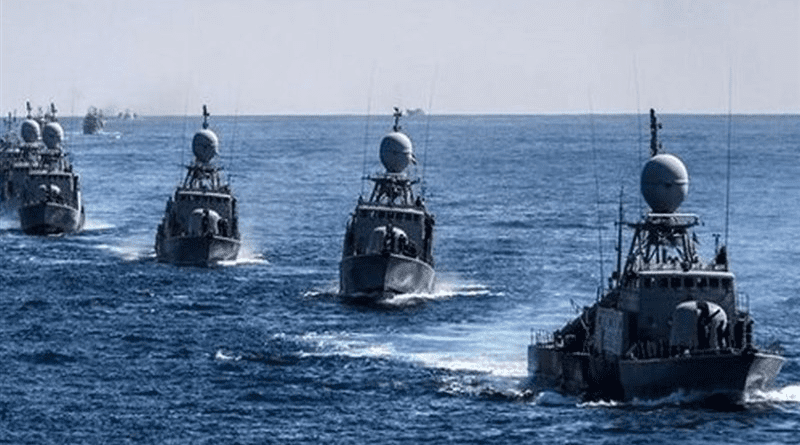US Should Beware Iran’s Latin American Maneuvers – OpEd
By Arab News
By Dr. Majid Rafizadeh*
It should be a serious warning to the international community, particularly the US, that the Iranian regime has been increasing its military presence in Latin America.
The Islamic Republic has been emboldened to the extent that it is currently sending warships to the Panama Canal for the first time in its history. Iranian state-controlled news outlet Tasnim News Agency, which is linked to the Islamic Revolutionary Guard Corps, last month boasted: “The Iranian flotilla, comprised of Dena and Makran warships, will reportedly arrive at the Brazilian port (Rio de Janeiro) within the next few days. The 86th flotilla set sail from south of Iran in early autumn with the purpose of circumnavigating the world. The trip to Brazil appears to be part of a mission to the Panama Canal. On January 11, Iranian Navy Commander Rear Admiral Shahram Irani said plans are underway to dispatch naval forces to the Panama Canal as Iranian servicemen are approaching the coasts of the Americas.”
It is important to point out that the Iranian regime possesses the largest and most diverse arsenal of ballistic missiles and drones in the Middle East, in spite of the sanctions imposed against it. The regime has been sending drones to Russia and Tehran is a major arms provider to its proxy militia and terror groups across the region. Tasnim reported that the regime’s warship Dena, which is heading to Central America, is a “Mowj-class warship that joined the Iranian Navy in June 2021. The military vessel is equipped with anti-ship cruise missiles, torpedoes and naval cannons.” It added: “The other vessel of the flotilla is Makran, a forward base ship weighing 121,000 tons. The oil tanker-turned-warship can carry five helicopters and is employed for providing logistical support for the combat warships.”
Iran’s agenda in the Americas is anchored in political opportunism and strategic penetration of Latin America. As Mohsen Rabbani, who was the Iranian cultural attache in Buenos Aires during the 1994 AMIA attack, pointed out: “According to our Islamic point of view, Latin America is for us and the international world a virgin area that, unfortunately, till now, its huge potential has not been taken into account by the Islamic people of Iran … We have a solid support against the imperialism and Zionism intrigues, being an important aid in favor of our presence in the area.”
But in addition to expanding their military stranglehold in the region, the Iranian leaders have also been strengthening relationships with Latin American countries for economic reasons, mainly to evade sanctions. For example, the Islamic Republic has been shipping considerable amounts of oil to Venezuela without either country fearing repercussions from the US Biden administration.
According to Reuters, a shipment that was delivered last June was “the third of Iranian crude supplied by Iran’s Naftiran Intertrade Co. to Venezuela’s state-run oil firm PDVSA following a supply contract providing the South American nation with lighter crude. Venezuela has been processing the Iranian oil in its refineries … (Another) two Iran-flagged tankers, the very large crude carriers Dino I and Silvia I, had arrived last month at Venezuelan ports carrying the first cargoes of Iranian crude for Venezuela.”
It is worth noting that the Iranian regime is also signing long-term agreements with its oil clients to permanently insulate its economy from US sanctions. For example, the regime last year signed a 20-year cooperation agreement with Venezuelan leader Nicolas Maduro to expand their bilateral ties. “We have important projects of cooperation between Iran and Venezuela in the fields of energy, petrochemicals, oil, gas and refineries,” Maduro stated.
Former Florida Republican Gov. Jeb Bush, who is an advisory board member of United Against Nuclear Iran, confirmed that Panama has also been helping Iran by buying its oil. He added that Panama “has been instrumental in the (Iranian) regime’s continued survival” and that it is “strengthening Iran by helping it to circumvent sanctions.”
Furthermore, from the perspective of the Iranian leaders, Latin American countries are opportune places for covert intelligence operations, specifically against the US. This has caused concern among some officials about Iran’s increasing influence in America’s backyard. For example, Florida Republican Sen. Marco Rubio said in a statement last week that “Iran’s growing presence in the Western Hemisphere should come as no surprise as the Biden administration has a history of appeasement and engaging with authoritarian regimes. Tehran’s ability to expand its military presence in our hemisphere should be a warning sign, especially as it seeks to support the left-wing Marxist regimes that will undermine peace and stability throughout the region.”
In a nutshell, the US should not underestimate or disregard the Iranian regime’s rising military presence in Latin America.
- Dr. Majid Rafizadeh is a Harvard-educated Iranian-American political scientist. Twitter: @Dr_Rafizadeh

